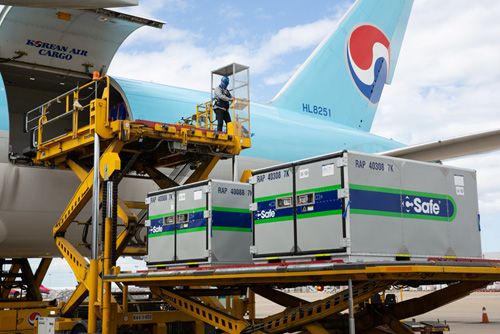Korean Air gets ready to deliver COVID-19 vaccine to the world

Korean Air, with one of the world’s largest cargo operations, has launched a COVID-19 vaccine transport task force to prepare for the safe and swift transport of the vaccine once it becomes available.
Transporting vaccines is a very delicate and challenging process requiring specialized storage facilities and equipment. Vaccines generally need to be stored at low temperatures between 2 and 8 degrees Celsius whereas some types require temperatures as low as -70 degrees Celsius.
Korean Air’s cargo terminal at Incheon International Airport has 1,292 m2 of cold storage that can accommodate 100 tons of freight. In addition, to expand its operations, the airline plans to use the 2,533-m2 Cool Cargo Center next to Incheon International Airport Terminal 2 when it opens next year.
Korean Air has considerable experience delivering specialized and emergency freight during the COVID-19 pandemic including medical equipment and personal protection equipment (PPE). In April, the airline was recognized for its swift delivery of half a million COVID-19 test kits to Baltimore-Washington International Airport in Maryland, US, an airport it had never visited before.
Because of the carrier’s expertise in managing and transporting pharmaceuticals, Korean Air has been certified by IATA’s Center of Excellence for Independent Validators on Pharmaceutical Handling (CEIV Pharma).
IATA recently announced that 8,000 Boeing 747s will be needed to transport one dose of the COVID-19 vaccine for every person in the world. Air transport will be crucial and in high demand for the vaccine’s safe and timely distribution.
“Korean Air’s task force is reviewing all aspects concerning the vaccine’s transport, and will develop a strong system and infrastructure for its safe and swift distribution when it’s ready to be delivered,” said EUM Jae Dong, Senior Vice President and Head of Cargo Business Division at Korean Air.
The airline’s task force is monitoring vaccine developments including:
- vaccine types and corresponding storage temperatures;
- identifying and securing necessary equipment and facilities;
- strengthening monitoring, safety and security procedures to deal with exceptional situations; and
- conducting simulations of diverse scenarios.
“Korean Air is doing its best to help bring an end to the COVID-19 pandemic by delivering the vaccine throughout the world as quickly and safely as possible,” EUM added.
